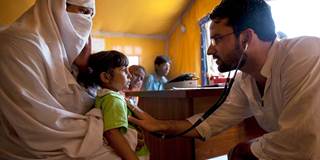Although governments and humanitarian-aid groups have made efforts to provide basic health care to refugees, they have struggled to ensure that such care is delivered reliably. Biomedical engineers have an opportunity, as well as a responsibility, to bring their expertise to bear on this problem.
BOSTON – A resurgence of nativism and xenophobia in countries around the world has created a toxic environment for those fleeing from geopolitical crises. But among the many challenges that refugees must confront while they await resettlement, finding access to high-quality physical and mental health care tops the list.
It is a challenge that demands more attention not just from doctors, nurses, non-governmental organizations, and other relevant actors, but also from engineers, who can make indispensable contributions to global public health. Those contributions are highly relevant to refugees.
Beyond building bridges and creating gadgets, engineers can help improve the quality and affordability of health care around the world, by developing faster methods for diagnosing diseases and delivering medical services. Scientists and engineers in my own research area have already invented devices to help vulnerable babies breathe easier, detect malaria and HIV in war zones, and keep counterfeit medicines out of rural areas.

BOSTON – A resurgence of nativism and xenophobia in countries around the world has created a toxic environment for those fleeing from geopolitical crises. But among the many challenges that refugees must confront while they await resettlement, finding access to high-quality physical and mental health care tops the list.
It is a challenge that demands more attention not just from doctors, nurses, non-governmental organizations, and other relevant actors, but also from engineers, who can make indispensable contributions to global public health. Those contributions are highly relevant to refugees.
Beyond building bridges and creating gadgets, engineers can help improve the quality and affordability of health care around the world, by developing faster methods for diagnosing diseases and delivering medical services. Scientists and engineers in my own research area have already invented devices to help vulnerable babies breathe easier, detect malaria and HIV in war zones, and keep counterfeit medicines out of rural areas.